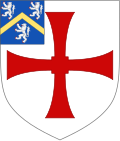Sports
General
- College Varsity, a sporting competition between college teams from Durham University and the University of York held alternately at York and Durham in the Lent term since 2014. [2]
- Doxbridge Tournament, an unofficial sporting competition held annually since 1999 at the start of the Easter holiday between college teams from Durham University, the University of Oxford, the University of Cambridge and (since 2011) the University of York. [3] [4]
- Team Durham, formerly the Durham University Athletic Union, a student-run organisation responsible for sport at Durham University. In 2006, the Athletic Union was rebranded "Team Durham" to signify a more modern approach to sport at Durham. In contrast to most British universities, it is a separate organisation with the status of a students' union, rather than a part of Durham Students' Union, the primary student representative body at Durham University.
- There are many college sports teams which allow for participation in sport at a less intense level than the university sports teams. There are leagues or tournaments between colleges in most major sports, with many colleges having multiple teams covering a wide range of ability levels. This is a contributing factor to the high participation in sport at the university.
Clubs
- Association football:
- DUAFC
- Rugby union:
- Durham University Rugby Football Club, previous members have included England captains Phil de Glanville and Will Carling.
- Quidditch:
- Durhamstrang [5]
Rowing
Durham College Rowing organises several regattas and head races each year:
- Novice Cup - a coxed IV regatta held in the first term for new rowers. [6] [7] This was known as the Hatfield Cup until 2003, when Durham College Rowing took over the organising of the event. [8]
- Novice Head - a 1.8 km upstream head race for novice coxed IVs. [9]
- Senate Cup - a regatta for men's and women's coxed IVs. [10] This intercollegiate event on the Wear in Durham has been running for well over a hundred years; with interruptions due to poor weather, the First World War, the Second World War and the Covid-19 Pandemic. [11]
- Senate Head - a 1.8 km upstream head race for experienced coxed IVs. [12]
- Admiral's Regatta - a summer regatta; generally the final rowing event for the academic year. [13]
College boat clubs
Each college boat club is an independent organisation registered with British Rowing. They are also members of Durham College Rowing.
